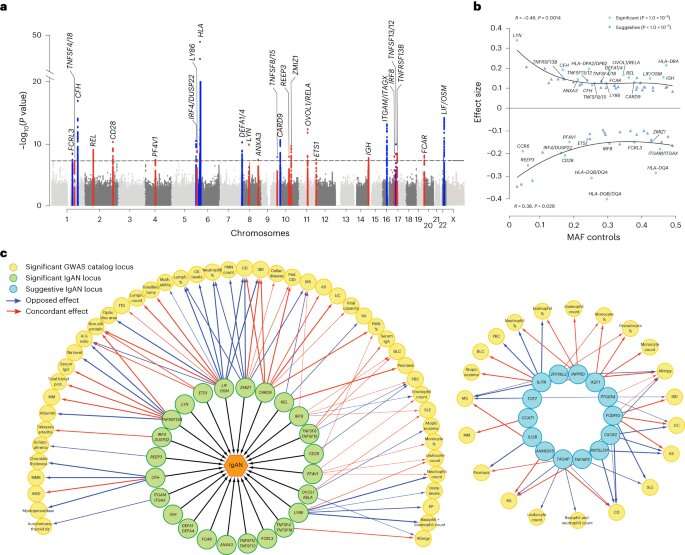This article has been reviewed according to Science X's editorial process and policies. Editors have highlighted the following attributes while ensuring the content's credibility:
fact-checked
peer-reviewed publication
trusted source
proofread
Source of common kidney disease lies outside the kidney, study suggests

The cause of a common kidney disease likely lies outside the kidney, according to a new study led by Columbia University researchers. The study, which uncovered 16 new locations in the genome linked to immunoglobulin A (IgA) nephropathy, confirms an earlier hypothesis that the immune system has an important role in driving the disease and points toward new strategies for detecting and treating it.
No targeted treatments have been approved to treat IgA nephropathy, largely because the underlying cause of the disease has not been well understood.
Identifying genes linked to a disease can provide clues to its source and guide the development of new drugs, but thousands of patients are needed for such studies. For IgA nephropathy, those numbers are difficult to achieve.
Though common compared to other forms of kidney disease related to the immune system, IgA nephropathy is hard to diagnose, and confirmed patients are difficult to find. "The diagnosis requires a kidney biopsy, which is an invasive procedure that carries a lot of risks, so the diagnosis is frequently missed," says Krzysztof Kiryluk, MD, associate professor of medicine at Columbia University Vagelos College of Physicians and Surgeons and lead author of the study.
Kiryluk and his colleagues tackled the numbers problem by building a vast network of collaborators, eventually including nephrologists, geneticists, and other scientists scattered across four continents. Each collaborator recruited biopsied patients locally and sent blood samples to Kiryluk's Columbia team for DNA extraction and analysis.
With samples from almost 40,000 subjects, the researchers compared DNA from IgA nephropathy cases to DNA from people who do not have the disease. The study, which took 10 years to complete and involved nearly 200 scientists and clinicians at more than 100 institutions, is the largest ever of the genetics of IgA nephropathy.
Many of the new genes identified in the study are involved in the production of IgA antibodies, reinforcing the idea that regulation of IgA levels is the key factor behind the disease.
"That's a very important finding because IgA nephropathy is considered to be a kidney disease, but it seems like its source is outside the kidney," says Kiryluk.
"We also developed a genetic risk profile that may help identify patients at highest risk of progression to kidney failure," says Ali Gharavi, MD, the Jay Meltzer, MD, Professor of Nephrology and Hypertension and co-leader of the study.
The researchers also identified proteins produced by the newly identified genes that look like the best targets for drug development. And they identified two drugs already studied for other conditions that may have potential as IgA nephropathy treatments.
"A recent analysis found that drug targets backed by genetic studies are more likely to succeed," Kiryluk says, "and we hope that pharmaceutical companies will start developing new therapies based on our findings."
The paper is published in the journal Nature Genetics.
More information: Krzysztof Kiryluk et al, Genome-wide association analyses define pathogenic signaling pathways and prioritize drug targets for IgA nephropathy, Nature Genetics (2023). DOI: 10.1038/s41588-023-01422-x



















